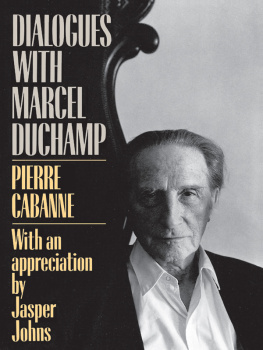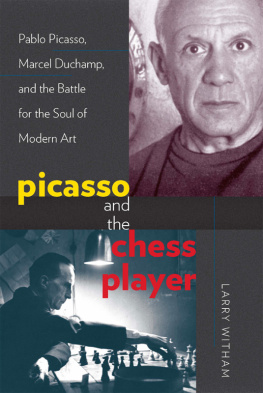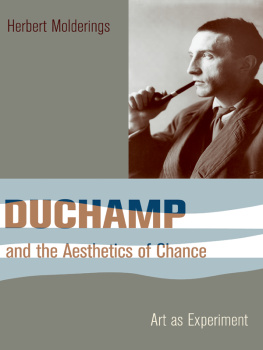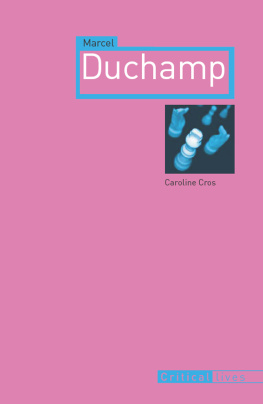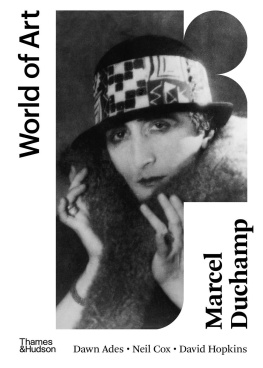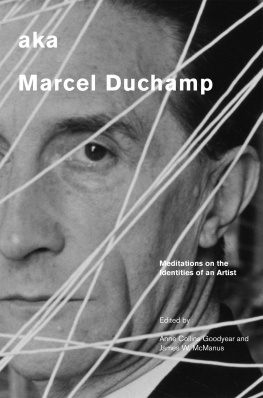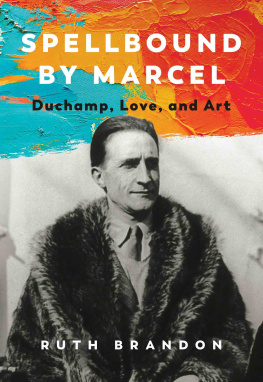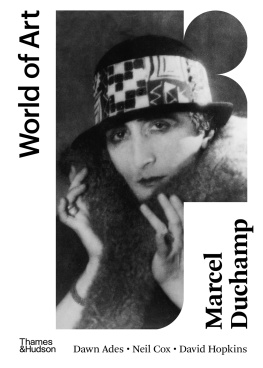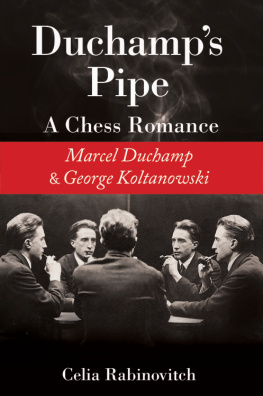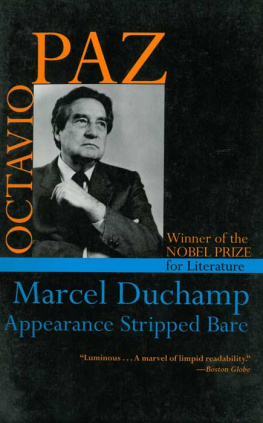Cabanne, Pierre.
Dialogues with Marcel Duchamp.
Published by Da Capo Press, Inc.
A member of the Perseus Books Group
Introduction by Robert Motherwell
I n the original French edition of this book, Pierre Cabanne wrote, shortly before Duchamps death: These interviews with Marcel Duchamp took place in his studio at Neuilly [near Paris], where he and his wife live during the six months they spend in France each year. It is the first time that the most fascinating and the most disconcerting inventor in contemporary art has agreed to talk about and explain, so profoundly and at such length, his actions, his reactions, his feelings, and the choices he made. He adds that Duchamp gave these interviews with a serenity from which he never departed, and which gave his theorems an undeniable grandeur; one divined a man not only detached, but preserved. Through his creative acts, Marcel Duchamp did not want to impose a new revolutionary language, but to propose an attitude of mind; this is why these interviews constitute an astonishing moral lesson.... He speaks in a calm, steady, level voice; his memory is prodigious, the words that he employs are not automatic or stale, as though one is replying for the nth time to an interviewer, but carefully considered; it must not be forgotten that he wrote Conditions of a Language: Research into First Words. Only one question provoked in him a marked reaction: near the end, when I asked him whether he believed in God. Notice that he very frequently utilizes the word thing to designate his own creations, and to make to evoke his creative acts. The terms game, or it is amusing, or I wanted to amuse myself, recur often; they are ironic evidence of his nonactivity.
Marcel Duchamp always wore a pink shirt, with fine green stripes; he smoked Havana cigars incessantly (about ten a day); went out little; saw few friends; and went neither to exhibitions nor to museums....
The present translation into English contains the entire text of the interviews, but differs in several respects from the French edition. The latter was not illustrated, and while Duchamps work is not illustrated here (since there are several books containing illustrations of most of his work), he is. When he was asked if he would like to write a preface to this English-language edition, he replied that he would not but would like his friend and summer neighbor in Cadaques, Spain, Salvador Dali, to do so. Dalis preface appears here for the first time; so does a much more detailed chronology than in the French edition, and a more authoritative selected bibliography, by Bernard Karpel, Librarian of The Museum of Modern Art, New York.
(Pierre Cabanne, who was born in 1921, has been for some years art critic of the Paris review Arts-Loisirs. He has written books on van Gogh, the Cubist epoch, Degas, and Picasso, and he contributes to many French and foreign art magazines.)
Marcel Duchamps own numerous writings (in the original French or in English) were published as Marchand du Sel: crits de Marcel Duchamp, in 1958.
Duchamp died suddenly in his studio at Neuilly on October 1, 1968, at the age of eighty-one, a year and a half after the original French publication of these conversations.

These conversations are more than mere interviews. They are Marcel Duchamps summing up, and constitute as vivid a self-portrait as we possess of a major twentieth-century artist, thanks to Duchamps intelligence, scrupulousness, and disdain for the petty. Here, as throughout his life, he has rejected, as much as one can, that game of rivalry which makes so many modern artists uneasy and angry, or bitter, and sometimes false to themselves and to historical truth. In these pages, Duchamps effort to be objective is sustained with an intellectual strength and modesty (though he had his own arrogance) of which few celebrated artists approaching their eighties are capable. We are also fortunate in Pierre Cabannes intelligent choice of questions and his sheer tenacity as Duchamps questioner (he is obviously familiar with Duchamps remark, There is no solution because there is no problem). Cabanne intuitively knows when not to press too hard, and when to come back discreetly again and again to a dropped question, finally to receive the answer. On rereading these conversations, Duchamp said to Cabanne (in effect) that this is from the horses mouth. I, for one, shall always be grateful to Duchamp for his willingness to be so intensively recorded, just before he died.

I knew Duchamp casually, beginning in the early 1940s, in New York City, in the French Surrealist milieu. Later in the decade, we used to meet when I was working on vexing questions that arose while I was editing my Dada anthology. Most of my questions had to do with the clarification of various Dada mysteries (such as conflicting stories about the discovery of the name Dada) that had become clouded in legend so many years after the fact, often deliberately. Later, I enlisted his aid (which ultimately proved fruitless) in trying to reconcile Richard Huelsenbeck and Tristan Tzara to having their recent writings appear together between the same covers. They detested each other, rivals long after the Dada period.
I had asked Duchamp to act as a mediator in regard to the book because of the sense one already had of him, seeing him among the Parisian Surrealists gathered in New York City during the Second World War. The Surrealists were the closest-knit group of artists, over the longest period of time, that I know of, with all the unavoidable frictions as well as the camaraderie implied by such intimacy. Often their various group projects produced violent disagreements. But their respect for Duchampwho was not a Surrealist, but as he himself said, borrowed from the worldand, above all, for his fairness as a mediator, was great. It seemed to me that he gave a certain emotional stability to that group in exile during those anxiety-ridden years after the defeat of France in 1940, when the Nazis gained everywhere, for a time.
I remember once at a Surrealist gathering watching Andr Breton and Max Ernst standing mouth-to-mouth, in that curious French fashion, arguing with rage about something I do not remembera personal matter, I think, but one which also raised the question of their professional indebtedness toward each other. At such moments as these, only Duchamp, with his detachment, his fairness (which, of course, is not the same thing), and his innate sensitivity, could try to bring calm.

